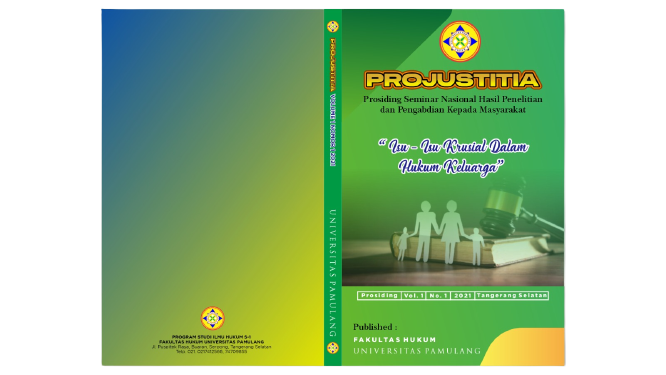RELEVANSI HAK IMUNITAS DPR BERDASARKAN UU NO 13 TAHUN 2019 (ANALISIS PUTUSAN MK NO 76/PUU-XII/2014)
Abstract
ABSTRAK
Hak Imunitas mencuat pada tahun 2014 melalui putusan Mahkamah Konstitusi No 76/PUU-XII/2014,hak imunitas DPR masih tetap diakui.Prokonta yang saling bertautan menjadikan hak imunitas sebagai buah bibir dari berbagai kalangan.Beberapa kali mengalamai perubahan UU No 2 Tahun 2018 perubahan kedua atas UU No 17 Tahun 2014,kemudian UU No 13 Tahun 2019 perubahan ketiga atas UU No 17 Tahun 2014.
Pasal 224 ayat (1) anggota DPR tidak dapat dituntut di depan pengadilan karena pernyataan,pertanyaan,dan atau pendapat yang dikemukakannya baik secara lisan maupun tertulis didalam rapat DPR ataupun diluar rapat DPR yang berkaitan dengan fungsi serta wewenang dan tugas DPR.
Prokontra hak imunitas menuai kegelisahan yang terjadi di masyarakat bilamana akan terjadi kesewenang-wenangan ataupun pemberian tafsiran hak imunitas sebagai benteng dari jerat hukum .Kekawatiran itupun disangkal oleh Mentri Hukum dan Ham Yasonna Laoly yang mengatakan jika masyarakat keberatan dapat melakukan gugatan ke MK.
Pengaturan mengenai hak imunitas anggota DPR dijamin Undang-Undang Dasar Negara Republik Indonesia Tahun 1945 yakni pasal 20A ayat (3).pengaturan lebih lanjut diatur melalui peraturan perundang-undangan yang mengaturnya,yakni: Undang-Undang No.17 Tahun 2014 tentang MPR,DPR,DPD,dan DPRD (UU MD3) dan tata tertib DPR Nomer 1 Tahun 2014.Anggota DPR dalam menjalankan fungsi,wewenang,dam juga tugasnya perlu diberikan pembekalan instrument dengan demikian diberikanlah DPR hak imunitas.
Kata Kunci : Hukum Internet; Kewenangan DPR; UUMD3
ABSTRACT
Immunity rights emerged in 2014 through the decision of the Constitutional Court No. 76/PUU-XII/2014, the DPR's immunity rights are still recognized. The interlinked pro-contracts have made the right of immunity a byword from various circles. Several times there have been changes to Law No. 2 of 2018 changes second on Law No. 17 of 2014, then Law No. 13 of 2019 the third amendment to Law No. 17 of 2014.
Article 224 paragraph (1) members of the DPR cannot be prosecuted in front of the court because of the statements, questions, and or opinions that are expressed either orally or in writing at the DPR meeting or outside the DPR meeting related to the functions and powers and duties of the DPR.
The pros and cons of the right to immunity have sparked anxiety in the community when there will be arbitrariness or the interpretation of the right of immunity as a bulwark against legal snares. This concern was denied by the Minister of Law and Ham Yasonna Laoly, who said that if the public objected, they could file a lawsuit to the Constitutional Court.
The regulation regarding the immunity rights of DPR members is guaranteed by the 1945 Constitution of the Republic of Indonesia, namely Article 20A paragraph (3). Further arrangements are regulated through the laws and regulations governing it, namely: Law No. 17 of 2014 concerning the MPR, DPR , DPD, and DPRD (Law MD3) and the rules of the DPR Number 1 of 2014. Members of the DPR in carrying out their functions, powers, and duties need to be provided with instruments so that the DPR is given the right of immunity.
Keyword : Internet Law; The Authority Of The DPR; UUMD3


